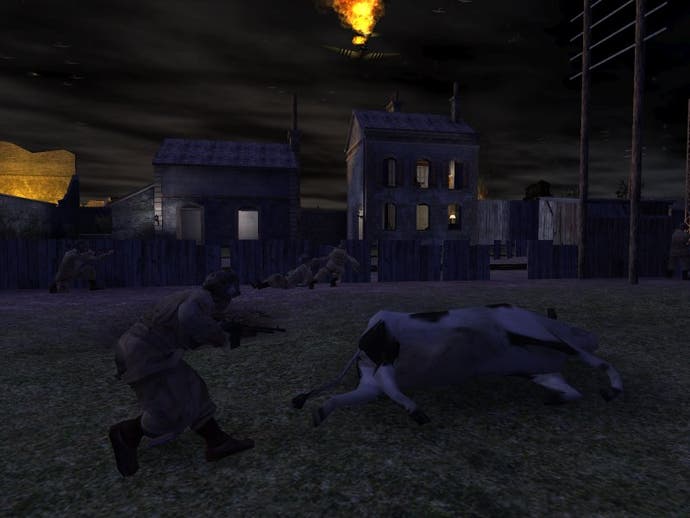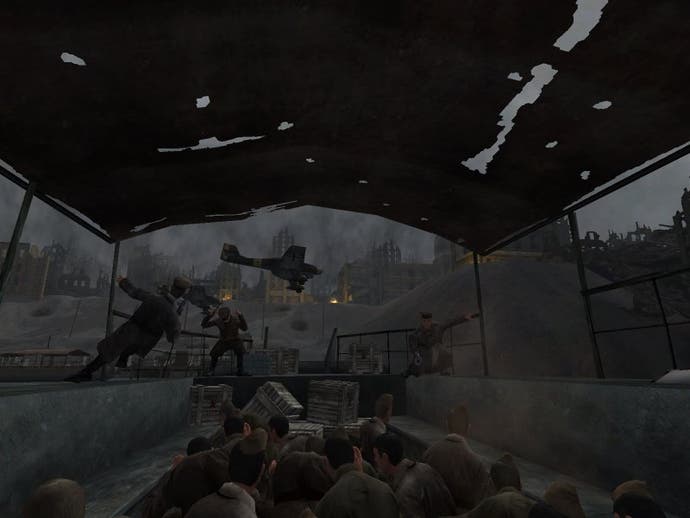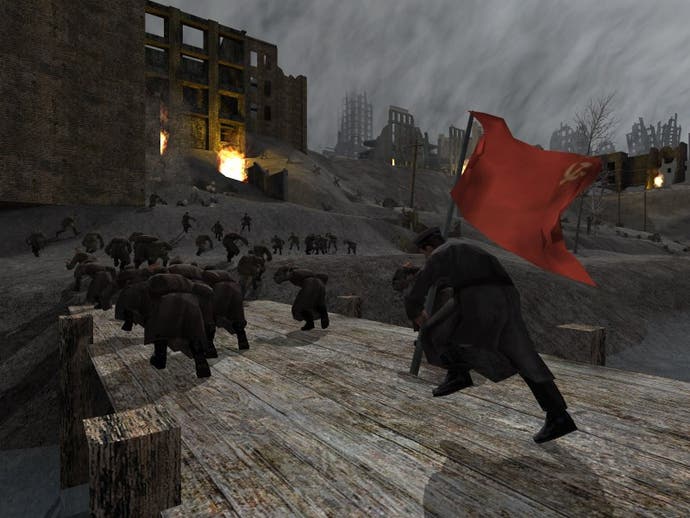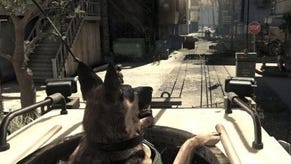Call Of Duty
Is it Mission Accomplished for Infinity Ward?
Rob's Second Opinion
When the original demo for Call of Duty was released, a friend of mine downloaded it and summed it up perfectly with a single phrase; "It's Allied Assault with bigger explosions". With the entire single-player game and a fair crack at the multiplayer behind me, I've not found much yet that contradicts what he said - but I'd like to add a quick addendum to it. Not only are the explosions bigger, but they're also in all the right places.
There's no mistaking the pedigree of this game - it's Medal of Honor with knobs on, and it makes little attempt to disguise itself as anything else. Even the interface is remarkably similar, and the graphics are so similar that in places you'll experience severe déjà vu (albeit somewhat higher polygon, more nicely textured déjà vu). It would be a mistake, however, to write this off as a Medal of Honor mission pack under a new name - because this builds on the original game to offer improvements in almost every aspect.
Dulce et Decorum

The trick, really - and the difference between my attitude to the game and Kristan's, I suspect - is not to approach Call of Duty as a first-person shooter, but as a cinematic experience. The analogy of a fairground thrill ride is an entirely fair one - the game drags you by the nose from one experience to the next, completely unrelenting in its pace and its action, and at times you feel like nothing more than an observer or a pawn rather than a central character.
The thing is, that's the whole point. You're not the hero that single-handedly wins World War II - you're one grunt among thousands, most of whom are going to die in the ditches and villages of Europe on the road to Berlin. More than anything else, this game conveys that perfectly; each encounter is finely tuned such that it is an incredible spectacle without ever glorifying the suffering it portrays, and such that it is stirring and entertaining without ever letting you forget the deathly seriousness of the historic events that unfold before you.
That's the genius of Call of Duty; a degree of art, direction and clever gameplay decision making which has made this into an homage to the conflicts represented within and the men who fought and died in them as much as a videogame. Medal of Honor started down this path, and Call of Duty continues much further, with scenarios and events that completely overshadow the portrayal of the D-Day landings in Allied Assault, a level which is widely considered to have achieved classic status.
No Substitute for Victory

For this reason, I personally think it's churlish to berate Call of Duty for failing to move the first-person shooter genre forward. Yes, it's point and shoot for the most part, but it's extremely well executed point and shoot, with a wide array of weapons, superb enemy and friendly AI, vehicles and gun emplacements to play with. Nothing to write home about, but solid, enjoyable FPS gameplay which offers up plenty of variety and does have a few nice quirks - such as the ability to look down the sights of any weapon properly, a minor tweak which adds a surprisingly large dash of realism to the proceedings.
However, Call of Duty doesn't set out to redefine the FPS genre - it sets out to tell a story and provide a spectacle, and it succeeds with flying colours at these things. I've never before played an FPS game which provoked such an emotive response - but watching the terrified conscripts at the troop landings at Stalingrad, with each second man being handed a clip of bullets and told to pick up a rifle from his squadmate's corpse when he's shot, put a lump in my throat - and the sight of battalions of shivering boys hurl themselves across Red Square with the rifles of their own officers awaiting any man who retreated, and the machine gun emplacements of the Germans awaiting at the other side of the square, made my blood boil.
In places, the direction treads a fine line and threatens to become a little too pretentious, but yet somehow the deft touch of the development team keeps it from ever becoming excessively clichéd - even the scene where the battle to hold a bridge in France becomes intense and men start to fall all around you while slow, sad music plays in the background somehow escapes from being puke-inducingly pretentious, and comes across as being genuinely moving and tragic.
On the Beaches

Although the Quake III engine is certainly starting to creak around the edges, and can't really hold its own against more modern engines like the latest builds of the Unreal technology or the Source engine, the Call of Duty team have absolutely made the most of the tech available to them. The game is full of movement and action, with dozens of soldiers on-screen at once, artillery barrages lighting up the night, aircraft overhead being shot down by AA batteries, buildings burning and mortar shells kicking up dirt high into the sky. Using an older engine has allowed the team to put tons of stuff on screen at once rather than focusing on a few individual detailed elements, which was the right decision for a game like this - and where they have added detail, it's obvious that a lot of thought has gone into it. The facial detail of your fellow soldiers, for example, has been increased massively - giving each one a unique identity, and allowing you to see just how young and how scared the majority of the participants in the war were.
One major criticism of Allied Assault was that the game didn't really hold its own as a multiplayer experience, mostly because the multiplayer felt as though it had been tacked on as an afterthought - with weapons that weren't balanced shockingly well for that type of gameplay. Although only extended play will settle the argument either way, first impressions of Call of Duty's multiplayer modes are good - the game's weapons are better suited to multiplayer, and a selection of interesting game modes and maps is available out of the box, including a Counter-Strike style bomb planting/defusing mode which is sure to prove popular online.
It's also great to see a modern FPS game that runs on aging hardware - again something which you have the Quake III engine to thank for. On my test system, a 1.5GHz Athlon with a Geforce 4 Ti4600, the game ran in 1600x1200 with every graphical enhancement enabled and maintained an extremely respectable, smooth frame-rate - good news particularly for anyone with an older PC, or anyone who likes playing online (where a few frames per second can mean the difference between a bullet in your head, or the other chap's).
Never Surrender
As you may have gathered, my opinion of Call of Duty differs very radically from Kristan's. I didn't come to this game hoping to have my perspective on FPS titles changed - I came to it hoping for a cinematic World War II experience, similar to the one that Allied Assault offered. I was not disappointed, and in fact, the game has improved upon Allied Assault in every possible way. There is simply no better representation of the World War II experience out there right now, and the Call of Duty team are to be commended for creating such a singularly fantastic slice of digital entertainment while simultaneously keeping a sober and mature perspective on their serious subject matter. All eyes will of course now be on EA to see how Pacific Assault turns out - but to my mind, Call of Duty is going to be a very, very hard act to follow.










